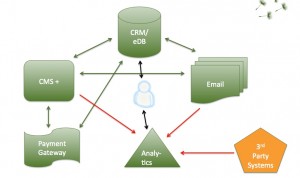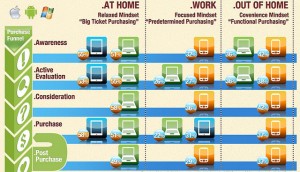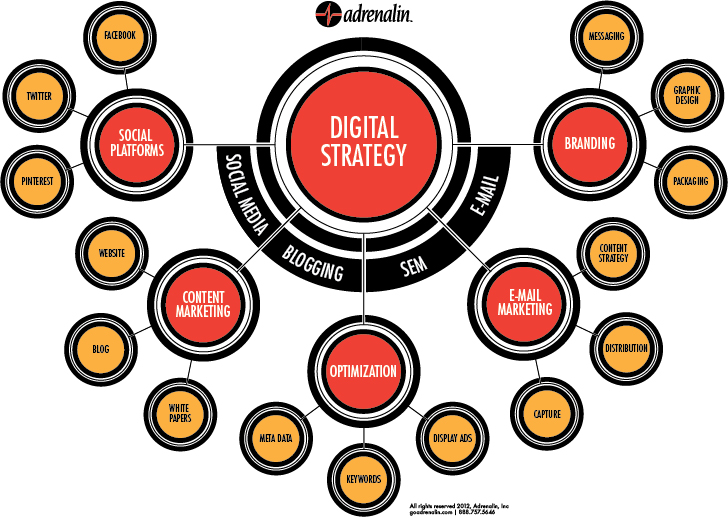Are you ready to dive into digital?
Before I can develop a digital strategy for any business, I need to first understand how the business works, what their resources and org structure looks like, which systems and processes are in place and most importantly, what the role of online is, within the business and for the consumer. I need to know all of this information before I can work with the business to achieve their digital marketing goals.
Of course having some digitally savvy resources and skill-sets within the team are important but if you have the right systems and processes in place, a business can operate in the digital space without a digital marketing specialist, or just an outsourced one.

A good Digital Strategy will include the Systems, Processes and Infrastructure. These backend digital elements are more important than the consumer facing digital marketing
But to do this, you need to absolutely understand your audience – their consideration cycle and where your business falls (beginning, middle or end), their wants and needs and what their natural behaviour is – online and offline. The role of online, and a future digital strategy, must be determined by the customer’s needs and their natural behaviour. Of course there may be many segments within your audience and their needs and behaviour may all be different. If this is the case, then your digital strategy must accommodate the needs of each audience segment and how they think and feel – about your brand, about researching or transacting online and about their consideration cycle (which determines when your business enters the customers consideration – during research, through a recommendation, because of past experience with the business brand or because it is the only choice).
Questions to ask before diving into a Digital Strategy
To determine the role of online within your business, we must establish the following things:
- Are your audience online/ Do your customers look for your product or service online?
- Does the business have a product or service that can be purchased/ sold online?
- Will making your product or service available online suit your customer’s needs/ help them achieve their goal?
- What are the stock, storage and delivery requirements for your product or storage?
- What is the cost to the customer for buying online? Is it prohibitive?
- If your product or service able to be replicated multiple times? Can interaction with your customers online be automated?
- Can an automated online service meet your customers needs?
- Do you have a good business reason (from the customer’s point of view) to collect customer data online?
- Will your customers understand why your business is asking for this information?
- Is online the only place your customers can buy, engage your service or product?
- Do you have bricks and mortar stores or another touch-point with your customers?
- What are the costs/ or savings of selling your product or service online?
- Is it cheaper for your customer to buy online than in store? Or is it more convenient?
- Does selling online reduce overhead costs for the business?

This graph gives some insight into the role of online in the customer’s purchase consideration cycle – when researching at home, at work or on the move.
What is the role of digital in your business?
This list is very simplistic but it gives you an idea of the types of questions a business needs to have the answers to before they can determine what the role of online is for your business. For many businesses I work with, the role of online is about offering customers choice of how they interact with the business and creating multiple touch-points with the customer. Sometimes businesses use online to save time and money – automating their transactions, systems and processes because there is no fundamental need for a human interface (such as buying consumer products).
For other businesses it is essential that they have an online presence because this is the natural behaviour of their audience – I’ll use recruitment as an example. Most people looking for a job start with the online job boards or specialist recruiters for their industry. Recruitment always requires a face to face interview (or on skype if location is an issue), but the first point of contact, the actual job listing is usually researched and found online, an application is then sent through an online transaction, before any face to face interview is granted. This is the consumer’s natural behaviour and expectation. That’s not to say that you can’t get a job any other way and of course there are some industries that don’t use job boards as their audience is more specialised and will be found through networking or head-hunting, but in general, job seekers start their job hunt online, so a recruitment business needs to have an online presence for their jobs to be found.

Regardless of how many audience or customer segments your online business may have, a good and sustainable digital strategy should meet all of their needs and still achieve the business goals.
Therefore, any digital strategy defined for your business, must be built around what the role of online is for your business and for your customers and their needs, wants and expectations. Once we understand WHY your business is using online as a way to engage with and transact with customers, then we can develop a sustainable acquisition or retention digital marketing strategy to meet your business and customer needs.
Digital Readiness
Once a busine ss has done the hard part of analysing their operations and learning about the wants and needs of their customers (so as to be sure where online fits in), they then need to set up a robust infrastructure to manage the operational workflow and customer journey. It is most often the case that when I am brought into a business, there are some systems and processes in place, but the business analysis has been done from the inside out, rather than the outside (from the customer’s point of view), in. The customer doesn’t need to know about the infrastructure that supports their online transaction – they just need to trust that they will receive their product or service as promised. A good digital strategy will ensure that not only does the front end that the customer engages with offer a good user experience but that the backend systems and processes are also streamlined and efficient for the business and the follow through customer engagement (delivery, follow up and future transactions).
ss has done the hard part of analysing their operations and learning about the wants and needs of their customers (so as to be sure where online fits in), they then need to set up a robust infrastructure to manage the operational workflow and customer journey. It is most often the case that when I am brought into a business, there are some systems and processes in place, but the business analysis has been done from the inside out, rather than the outside (from the customer’s point of view), in. The customer doesn’t need to know about the infrastructure that supports their online transaction – they just need to trust that they will receive their product or service as promised. A good digital strategy will ensure that not only does the front end that the customer engages with offer a good user experience but that the backend systems and processes are also streamlined and efficient for the business and the follow through customer engagement (delivery, follow up and future transactions).

This infographic represents a digital marketing strategy, which is a sub-set of the digital strategy, and the front end consumer engagement and online advertising. A digital strategy covers more than just digital marketing.
Digital marketing strategy
As you’re starting to see from this article, digital strategy is not just about the fun stuff at the front – the marketing and advertising that assist in bringing the customers in the door or to your website, but also the online experience they have when transacting through your website or social media profile, the thank you email and invoice they receive, the promptness of the delivery and the packaging as well as the cost of sale and operational/ administrative costs of running the business online.
Know your customer and design your digital strategy around their needs
A strong and sustainable digital strategy will put your customer’s needs first. Understanding the role of online, for your customer and for your internal business, is essential to create an effective and sustainable digital strategy that will serve your for 12-36 months. Digital platforms, systems and processes will continue to change and the user experience and expectations are forever changing with the technology and as we become more comfortable transacting online. So your strategy has to take all of these considerations into account and try and predict the future, not only analyse the past. A good digital strategy incorporates the full 360 degree view of your business and its marketing, not just the front end website and acquisition marketing.
If you need a good digital strategy that is sustainable for your business, call Parachute Digital on 02 9188 4493 to talk more.


Trackbacks/Pingbacks